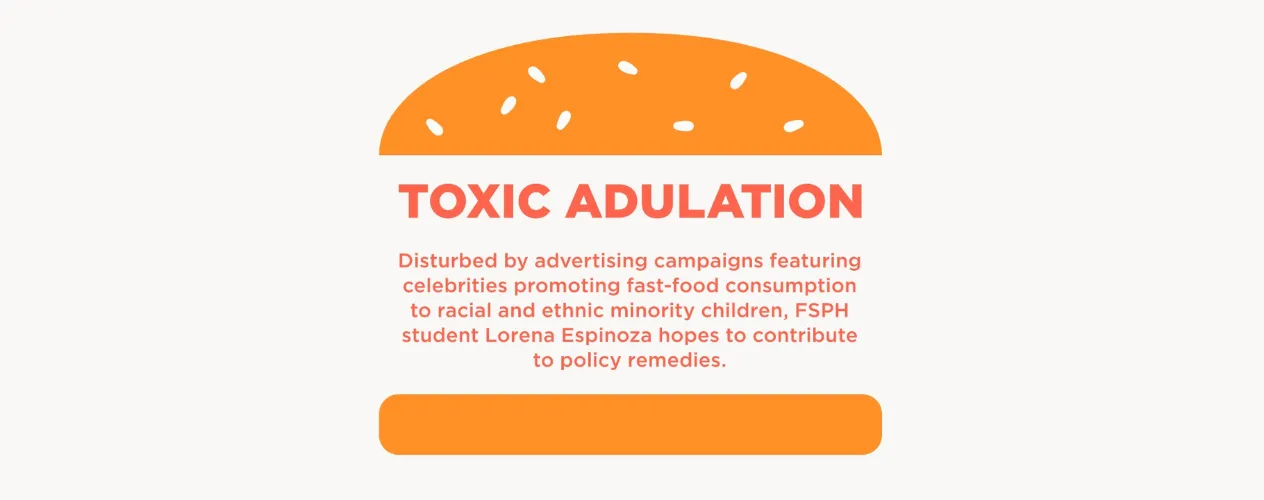Toxic Adulation
Disturbed by advertising campaigns featuring celebrities promoting fast-food consumption to racial and ethnic minority children, FSPH student Lorena Espinoza hopes to contribute to policy remedies.


WITHOUT A SINGLE NEW MENU INGREDIENT, McDonald’s sales surged in September 2020 after rap megastar Travis Scott (pictured at right) teamed with the fast-food behemoth on a digital marketing campaign promoting the $6 “Travis Scott Meal” — a Quarter Pounder with cheese, bacon, onions and lettuce; fries with barbecue sauce; and a Sprite. The company’s stock rose 6% in the campaign’s first month, with many of the chain’s outlets running out of ingredients. McDonald’s doubled down on that success, paying handsome sums to secure endorsements of other menu items by Gen Z icons — Colombian reggaeton artist J Balvin, K-pop boy band BTS, American rapper Saweetie. Rival fast-food chains raced to sign up their own pop-culture luminaries.
Lorena Espinoza didn’t share in the enthusiasm. “When I saw the commercials for these celebrity meals on social media, I knew exactly what this was,” says Espinoza, an MPH student in the UCLA Fielding School’s Department of Health Policy and Management. “Travis Scott was being paid millions of dollars to promote this unhealthy meal to kids — especially racial and ethnic minority children, who are more likely to consume fast food because it’s cheap and accessible in their communities.” Espinoza’s dismay over the celebrity campaigns comes from her personal experience. The daughter of Mexican immigrants whose father spent time as a migrant farmworker, she grew up in a community she describes as a food desert — surrounded by fast-food chains, and devoid of healthy and affordable alternatives. In a food-insecure household, Espinoza’s parents sought merely to ensure their children had access to meals, without regard to their nutritious value. Espinoza suspects her unhealthy diet contributed to her developing a chronic health condition. “It’s not just me — so many kids are in my shoes,” she says. “It’s amazing how many issues can be tracked to our childhood eating habits.”

There is very little understanding of the health outcomes of food advertisements targeted at children, which is why they are so potentially dangerous.
That realization motivated Espinoza to pursue an MPH, toward the goal of informing policies that address food inequities. Through the multidisciplinary, UCLA Fielding School-based Food Studies Graduate Certificate Program, she enrolled in a course on food policy taught in the UCLA School of Law; there, she began to investigate available evidence on the health impacts of targeted social media advertising such as the celebrity meals campaigns that had raised her ire. Espinoza’s findings and recommendations are of great interest to the law school’s Resnick Center for Food Law and Policy, whose founding executive director, Michael T. Roberts, teaches the course.
“There is very little understanding of the health outcomes of food advertisements targeted at children, which is why they are so potentially dangerous,” Espinoza says. “Children have constant access to social media as active participants, and it’s not as obvious to them as it is to adults when something is an ad. The huge influence of celebrities in our popular culture, especially among teenagers, makes them even more vulnerable.”
Espinoza says the experience has strengthened her resolve to work at the intersection of public health and the law to improve the food environment for young people in low-income communities. “It’s not appreciated that people are just going to eat the food that’s readily available in their community,” she says. “And when you have these commercials promoting the unhealthy foods that are prevalent in their environment, it’s only going to make it worse.
ㅤ